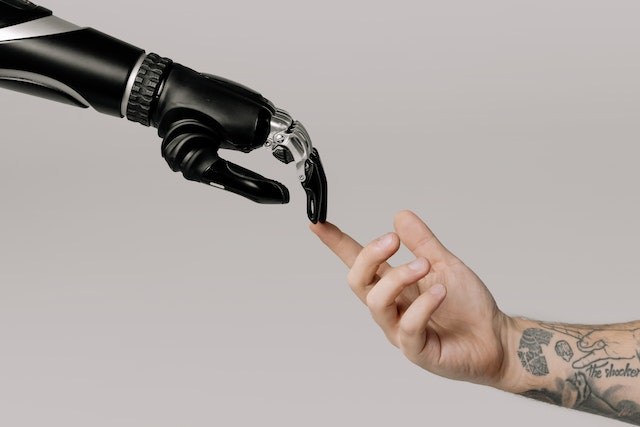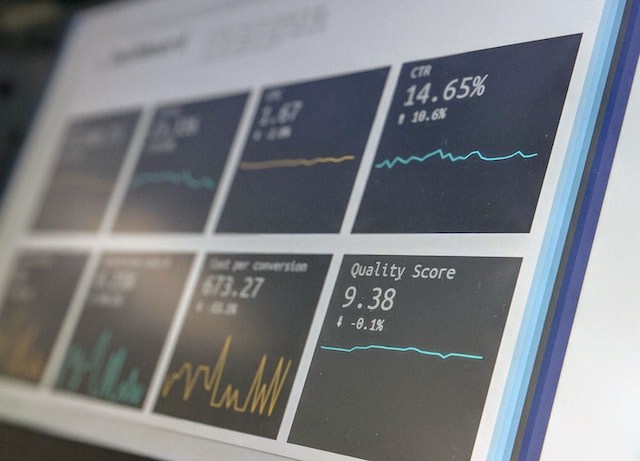Imagine a world where cutting-edge technology meets ancient healing practices. That's exactly what happens when AI and holistic medicine join forces. This groundbreaking integration combines the best of both worlds, merging the precision and efficiency of artificial intelligence with the holistic approach that encompasses the mind, body, and spirit.
By harnessing the power of AI, practitioners can analyze vast amounts of data, identify patterns, and make personalized recommendations for each patient. This not only improves diagnosis accuracy but also enhances treatment outcomes. Moreover, the holistic aspect emphasizes the importance of treating the individual as a whole, addressing underlying causes rather than just symptoms.
The integration of AI and holistic medicine revolutionizes healthcare, opening doors to unlimited possibilities. It empowers healthcare providers to deliver more targeted and effective care while fostering a deeper understanding of each patient's unique needs. With this synergistic approach, the future of medicine looks brighter than ever before.
I recommend watching this Youtube video:
Understanding Holistic Medicine and its Benefits
One of the key benefits of holistic medicine is its emphasis on prevention and self-care. Instead of solely relying on medication and invasive procedures, holistic practitioners encourage individuals to take an active role in their own health through lifestyle changes, stress management techniques, and natural remedies. This proactive approach can help prevent the onset of chronic diseases and promote long-term wellness.
Another advantage of holistic medicine is its focus on individualized care. Holistic practitioners take the time to understand each patient's unique needs, including their physical, emotional, and spiritual aspects. By addressing the root causes of health issues rather than just treating symptoms, holistic medicine aims to promote healing from within and restore balance in the body.

The integration of artificial intelligence (AI) in holistic medicine has the potential to revolutionize healthcare as we know it. AI technologies can analyze vast amounts of data and provide valuable insights to healthcare providers, leading to more accurate diagnoses and personalized treatment plans.
AI can also enhance patient care by improving communication between healthcare professionals and patients. Virtual assistants powered by AI can assist patients in managing their health, providing reminders for medication, tracking symptoms, and offering guidance on lifestyle modifications. This constant support can empower individuals to take a proactive approach to their own well-being.
Furthermore, AI can assist holistic practitioners in identifying patterns and trends in patient data, enabling them to make more informed decisions about treatment options. By leveraging AI algorithms, healthcare providers can access a wealth of knowledge and expertise that can enhance their holistic approach.
The integration of AI in holistic medicine holds great promise for the future of healthcare. By combining the comprehensive and individualized care of holistic medicine with the analytical power of AI, we can unlock new possibilities in preventive care, personalized treatments, and overall well-being. It's an exciting time for the field, and the potential benefits for patients are immense.
→ The Revolution of Artificial Intelligence in Healthcare and Medicine
The Role of AI in Healthcare
One of the key benefits of AI in healthcare is its ability to analyze vast amounts of patient data quickly and accurately. This enables healthcare professionals to make more informed decisions and provide personalized treatment plans. For example, AI algorithms can predict patient outcomes and identify potential risks, allowing doctors to intervene before complications arise.
AI can significantly improve the efficiency of healthcare processes. By automating routine tasks and streamlining administrative workflows, AI reduces the burden on healthcare professionals, allowing them to focus on delivering quality care. This not only saves time and resources but also enhances patient satisfaction.

AI also holds great promise in the field of diagnostics. Through machine learning algorithms, AI can analyze medical images, such as X-rays and MRIs, with exceptional accuracy. This aids in early detection of diseases and improves the accuracy of diagnoses, ultimately leading to better treatment outcomes.
"AI has the potential to transform healthcare by providing personalized treatment plans and improving diagnostic accuracy."
Furthermore, AI-powered virtual assistants are increasingly being used in healthcare settings to provide patients with personalized support. These virtual assistants can answer common medical questions, remind patients to take their medication, and even monitor vital signs remotely. By empowering patients to take charge of their health, AI enhances patient engagement and encourages self-care.
How can AI improve healthcare? AI can analyze vast amounts of data for accurate diagnoses, assist in surgery, and predict disease outbreaks, ultimately enhancing patient care.
What are the challenges of AI integration in healthcare? Challenges include data privacy concerns, ethical considerations, and ensuring AI systems are reliable and transparent in their decision-making process.
→ Navigating the Ethical Complexities of AI in Healthcare: The Evolution of Medicine
The Potential of AI in Holistic Medicine
One of the key areas where AI can make a significant impact is in diagnostics. By analyzing vast amounts of medical data, AI algorithms can detect patterns and identify potential health issues with incredible accuracy. This can lead to earlier detection of diseases and more timely interventions, ultimately saving lives.
AI can also enhance the treatment process in holistic medicine. By analyzing patient data, including medical history, lifestyle factors, and genetic information, AI algorithms can make personalized treatment recommendations. This can help healthcare providers tailor their approach to each patient's unique needs, maximizing the effectiveness of treatments.

Furthermore, AI can improve patient outcomes through continuous monitoring and remote care. With wearable devices and AI-powered systems, patients can receive real-time feedback and guidance, allowing them to actively participate in their own healing process. This can lead to improved compliance with treatment plans and better overall health outcomes.
The integration of AI in holistic medicine also holds great promise for research and innovation. By analyzing vast amounts of medical data from a variety of sources, AI algorithms can identify trends and patterns that may lead to new discoveries and advancements in healthcare.
The potential of AI in holistic medicine is immense. From diagnostics to treatment and research, AI can transform the way healthcare is delivered, unlocking a brighter future for patients and providers alike. By harnessing the power of advanced technology, we can unlock the full potential of AI and create a healthcare system that is more personalized, efficient, and effective.
→ The Impact of AI on Mental Health Treatment
Challenges and Limitations of AI Integration in Holistic Medicine
As AI continues to advance, its integration into various fields, including healthcare, holds immense promise. In the realm of holistic medicine, AI has the potential to unlock new possibilities and revolutionize patient care. There are several challenges and limitations that must be addressed to fully harness its benefits.
One significant challenge is the ethical use of AI in holistic medicine. While AI algorithms can analyze vast amounts of patient data and provide personalized treatment recommendations, questions of privacy and consent arise. Balancing the need for data-driven insights with patient confidentiality is crucial to maintain trust and ensure ethical AI integration.
Another limitation is the lack of data diversity in holistic medicine. AI systems rely on diverse datasets to generate accurate predictions and insights. Holistic medicine often lacks comprehensive and diverse data sources, making it challenging for AI algorithms to provide precise and tailored recommendations.
Furthermore, the interpretability of AI algorithms poses a challenge in holistic medicine. Understanding how AI arrives at its conclusions is crucial for clinicians to trust and effectively utilize the technology. Transparent and interpretable AI models are essential to ensure the safe and responsible integration of AI in holistic medicine.
There is a need to address the potential bias in AI algorithms. If not carefully developed and calibrated, AI systems can perpetuate existing biases and inequalities in healthcare. It is essential to continuously monitor and evaluate AI algorithms to mitigate bias and ensure equitable healthcare outcomes.
While AI integration in holistic medicine holds immense potential, there are challenges and limitations that must be carefully navigated. Addressing ethical concerns, diversifying data sources, ensuring interpretability, and mitigating bias are crucial steps towards unlocking the future of healthcare through AI and holistic medicine integration.
Practical Steps for Integrating AI in Holistic Medicine
In the rapidly evolving field of healthcare, the integration of artificial intelligence (AI) with holistic medicine holds immense potential. By combining the power of AI technology with the principles of holistic medicine, we can unlock a future of healthcare that is both personalized and efficient.
One practical step for integrating AI in holistic medicine is the development of AI-powered diagnostic tools. These tools can analyze vast amounts of medical data and provide accurate and timely diagnoses. By leveraging AI algorithms, healthcare professionals can make more informed decisions and improve patient outcomes.
Another important step is the integration of AI in treatment planning. AI can analyze patient data, such as medical history and lifestyle factors, to develop personalized treatment plans. This holistic approach takes into account the physical, emotional, and spiritual aspects of the individual, ensuring a comprehensive and effective treatment strategy.
AI can play a crucial role in patient monitoring and follow-up care. By continuously analyzing data from wearable devices and electronic health records, AI algorithms can detect early signs of disease progression and alert healthcare providers. This proactive approach enables timely interventions and prevents complications.
Furthermore, AI can enhance patient engagement and education. Through interactive platforms and virtual assistants, patients can access personalized health information and receive support throughout their healthcare journey. AI-powered chatbots can answer questions, provide guidance, and promote self-care, empowering individuals to take an active role in their well-being.
The integration of AI in holistic medicine has the potential to revolutionize healthcare. By taking practical steps such as developing AI-powered diagnostic tools, incorporating AI in treatment planning, utilizing AI for patient monitoring, and enhancing patient engagement, we can unlock a future of healthcare that is personalized, efficient, and patient-centered.
Ethical Considerations in AI and Holistic Medicine Integration
Ethical considerations play a crucial role in the integration of AI and holistic medicine, as this collaboration has the potential to unlock the future of healthcare. By combining the power of artificial intelligence with the holistic approach of medicine, we can revolutionize the way we diagnose, treat, and prevent diseases. It is important to address the ethical implications that arise from this integration.
One key ethical consideration is privacy and data security. As AI relies on vast amounts of data to make informed decisions, it is imperative to ensure that patient information is protected and used ethically. This includes obtaining informed consent from patients and implementing robust security measures to safeguard their data.
Another ethical concern is transparency and accountability. As AI algorithms become more complex, it is essential to understand how they arrive at their conclusions. Healthcare providers and AI developers need to be able to explain the reasoning behind AI-driven decisions, especially when they have a significant impact on patient care. Accountability measures should be in place to address any errors or biases that may arise from AI integration.
Furthermore, there is a need for ongoing monitoring and evaluation of AI systems in holistic medicine. Continuous assessment of their performance and ethical implications can help identify and rectify any potential issues. Involving interdisciplinary teams, including medical professionals, ethicists, and AI experts, can ensure a comprehensive approach to addressing ethical considerations.
While the integration of AI and holistic medicine holds great promise for the future of healthcare, it is crucial to consider the ethical implications that arise from this collaboration. By prioritizing privacy, transparency, accountability, and ongoing evaluation, we can ensure that AI and holistic medicine integration is conducted ethically and in the best interest of patients.
The Future of AI and Holistic Medicine: Recommendations and Predictions
AI and holistic medicine are two fields that hold immense promise for the future of healthcare. The integration of AI technology in holistic medicine has the potential to revolutionize the way we approach healthcare, offering new opportunities for personalized and effective treatments.
One of the key recommendations for the future of AI and holistic medicine integration is the development of AI-powered diagnostic tools. These tools can analyze a patient's medical history, symptoms, and lifestyle factors to provide a more accurate and timely diagnosis. By leveraging AI algorithms, healthcare professionals can make better-informed decisions and devise personalized treatment plans.
Another important aspect is the use of AI in patient monitoring and preventive care. AI-powered wearables can continuously monitor vital signs and alert both patients and healthcare providers of any abnormalities. This proactive approach can help prevent serious health complications and enable early intervention, ultimately improving patient outcomes.
Furthermore, AI can support research and development in the field of holistic medicine. By analyzing vast amounts of medical data, AI algorithms can identify patterns and correlations that may not be apparent to human researchers. This can lead to the discovery of new treatment modalities and interventions that can enhance the effectiveness of holistic medicine practices.
Predictions for the future of AI and holistic medicine integration include the widespread use of telemedicine and virtual healthcare platforms. AI-powered chatbots and virtual assistants can provide patients with personalized health advice and guidance, eliminating the need for physical consultations in many cases. This can improve accessibility to holistic medicine practices and reduce healthcare costs.
The future of AI and holistic medicine integration holds great promise for the healthcare industry. By embracing AI technology and leveraging its capabilities, we can enhance diagnostic accuracy, improve patient monitoring, and drive advancements in holistic medicine research. As AI continues to evolve, it is essential for healthcare professionals to embrace these opportunities and explore new avenues for delivering holistic and personalized care.
Final thoughts
As we conclude this exploration of AI and holistic medicine integration, it's evident that the future of healthcare lies in leveraging the power of AI to enhance the practice of holistic medicine. By combining the human touch with the efficiency and precision of AI, we can create a healthcare system that truly prioritizes patient well-being. However, it's crucial to navigate the challenges and ethical considerations that come with integrating AI in healthcare.
With careful planning, collaboration, and a patient-centric approach, we can unlock the full potential of AI in holistic medicine and pave the way for a healthier future.
Key Takeaways
- The integration of AI and holistic medicine has the potential to revolutionize patient care by providing personalized, comprehensive, and patient-centric treatment.
- AI can assist healthcare professionals in making accurate diagnoses, creating effective treatment plans, and improving patient outcomes.
- Ethical considerations, such as data privacy and bias, must be carefully addressed when integrating AI in holistic medicine.
- Collaboration between healthcare providers, AI developers, and patients is key to successfully implementing AI in holistic medicine.
Frequently Asked Questions
How can AI improve diagnostics in holistic medicine?
AI can analyze patient data, including symptoms, medical history, and lifestyle factors, to assist healthcare providers in making accurate diagnoses and creating personalized treatment plans.
What are the potential challenges of integrating AI in holistic medicine?
Some challenges include ensuring data privacy, addressing algorithm biases, and maintaining the human touch in patient care while relying on AI technology.
Can AI replace human healthcare providers in holistic medicine?
No, AI is meant to augment and assist healthcare providers, not replace them. The human touch and intuition are essential in holistic medicine.
How can patients benefit from AI integration in holistic medicine?
Patients can benefit from personalized treatment plans, improved access to healthcare resources, and round-the-clock support through AI-powered tools and virtual assistants.
What role does patient collaboration play in AI and holistic medicine integration?
Patient collaboration is crucial as it ensures that AI tools and technologies are aligned with their needs, preferences, and values, leading to more effective and patient-centric care.
